Key takeaways:
- News fatigue can negatively impact mental and emotional well-being, leading to irritability, anxiety, and disconnection from personal relationships.
- Recognizing signs of news fatigue includes feelings of dread when approaching news apps, difficulty concentrating, and physical symptoms like headaches.
- Supportive actions for friends include providing a listening ear, encouraging breaks from news consumption, and sharing positive or uplifting stories.
- Healthy media consumption strategies involve setting boundaries for news intake, curating trusted sources, and fostering discussions to deepen understanding and connection.
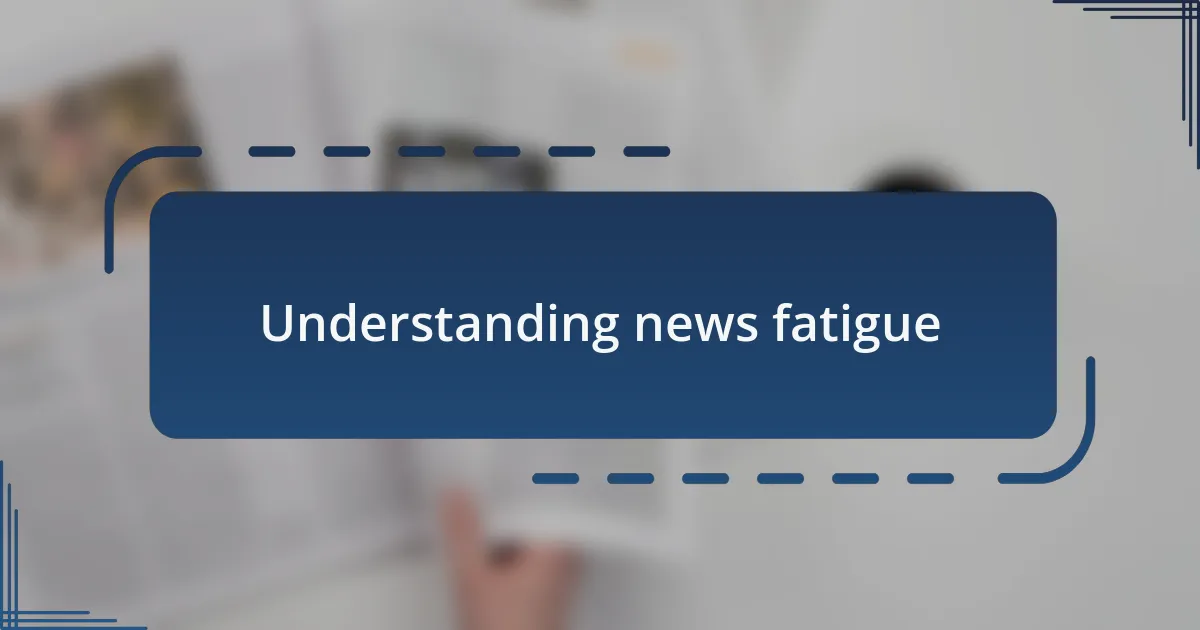
Understanding news fatigue
News fatigue is that overwhelming sensation we sometimes feel when the barrage of headlines becomes too much to bear. I recall a time during a major political event when I felt utterly exhausted after scrolling through countless updates. It left me questioning, how much information do I truly need to absorb in order to stay informed?
This fatigue isn’t just mental; it can seep into your emotional well-being. I’ve witnessed friends becoming irritable and anxious simply from consuming too much news. It makes me wonder, could taking a break really help us regain our focus and clarity, or are we just avoiding the inevitable next headline?
The constant cycle of urgent news can feel like a relentless drumbeat, drowning out other aspects of life. When I consciously decided to set specific times for catching up on news instead of constantly refreshing my feed, I found a renewed sense of peace. Isn’t it interesting how taking a step back can sometimes lead to a clearer perspective?
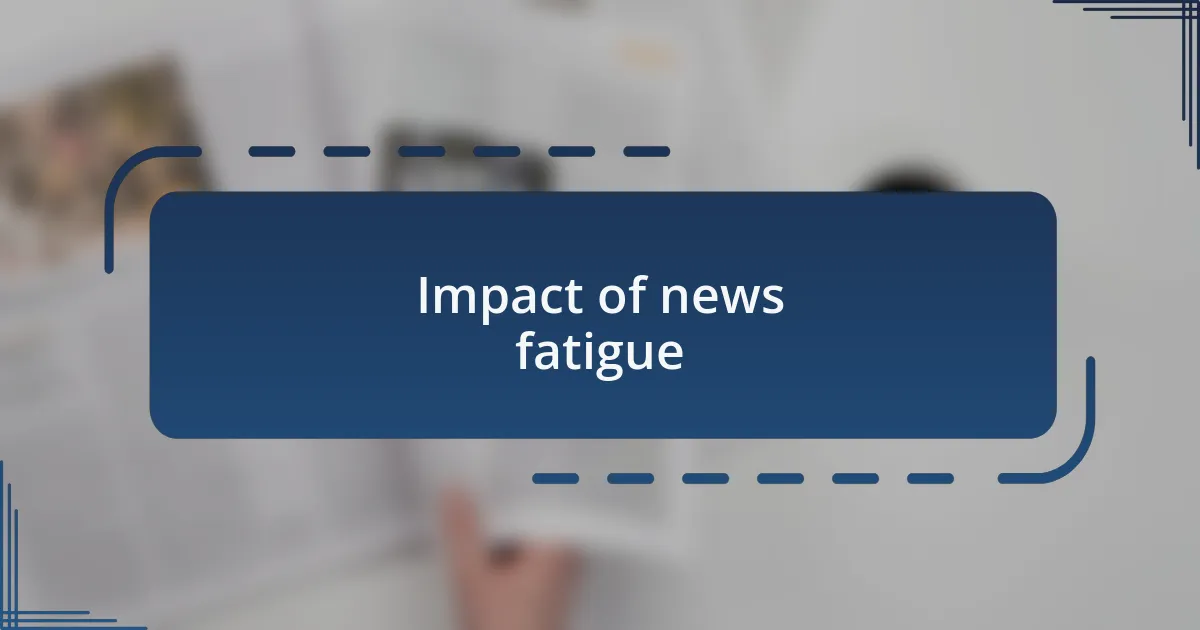
Impact of news fatigue
The impact of news fatigue can be profound, stretching beyond mere distraction. I remember a period when constant exposure to breaking news made me feel disconnected from everyday life. It was unsettling to realize that my energy was drained not just from the news itself, but from the emotional rollercoaster that accompanied it. How often do we consider that the headlines we consume can shape our mood?
Moreover, I noticed that my friendships suffered as well. I found myself hesitating to engage in conversations because I often felt overwhelmed by the negativity filling my mind. There were times when I’d rather scroll through social media than discuss current events, missing out on valuable connections with friends. Isn’t it ironic how the desire to stay informed can push us away from those we care about?
In the long run, this fatigue can lead to a false sense of apathy or a skewed perception of reality. During a particularly heavy news cycle, I disconnected for a weekend and was surprised at how much lighter I felt. It raised an important question for me: does disengagement offer us a chance to recalibrate our emotional responses, allowing us to engage with the world more thoughtfully?
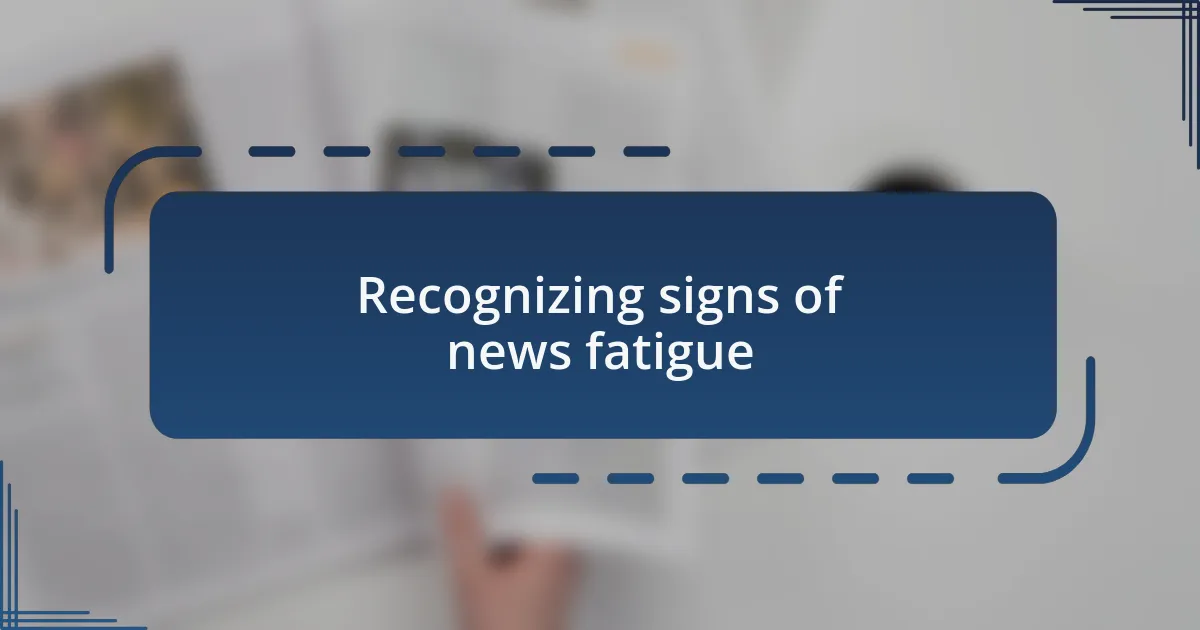
Recognizing signs of news fatigue
Recognizing signs of news fatigue can be subtle yet significant in our day-to-day lives. I recall a time when I would start avoiding the news altogether, opting instead to binge-watch familiar shows just to escape the anxiety. The moment I felt a sense of dread as I approached my news app was a clear signal that I needed to step back. Have you ever felt that pit in your stomach when you see a breaking news alert?
Another indication is the inability to concentrate on daily tasks. I noticed my attention wavering when I tried to read or work, as my mind kept drifting back to the latest headlines. It became clear to me that the incessant influx of information had clouded my focus. How often do we push through our day feeling mentally exhausted without realizing it’s the news weighing us down?
Physical symptoms can also manifest, such as headaches or a general sense of agitation. I remember feeling tense in my shoulders after a long scroll through social media feeds crammed with distressing stories. It made me realize that our bodies react to the emotional strain we carry from the news. Have you checked in with yourself to see how the news might be affecting your physical state?
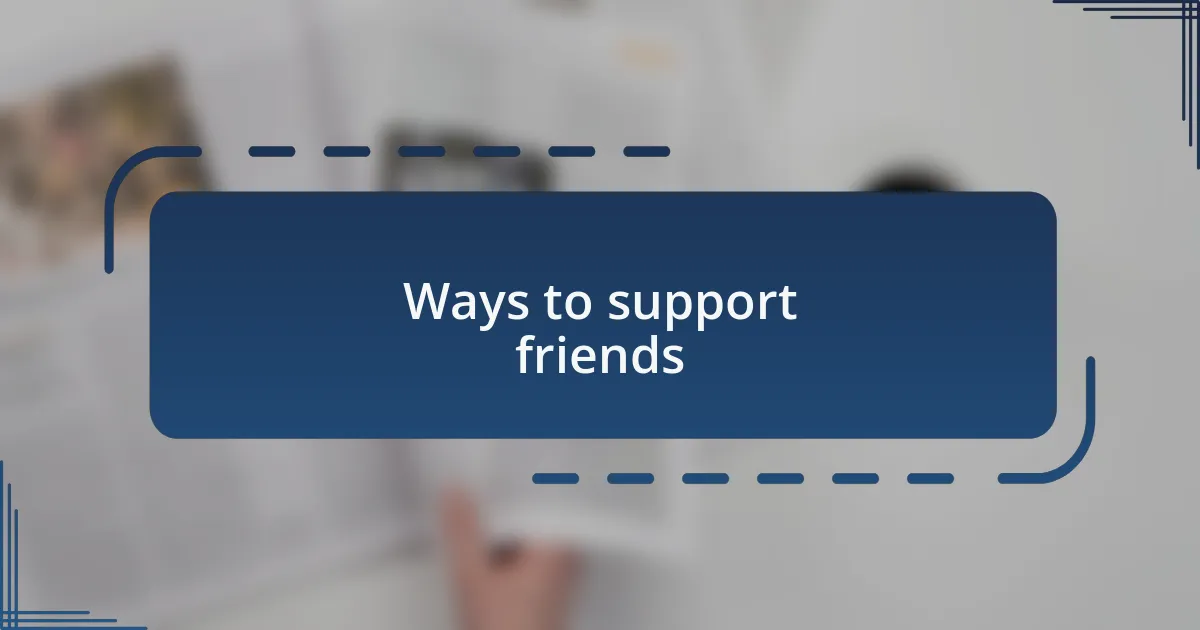
Ways to support friends
Offering a listening ear can make a world of difference. I once had a friend who felt overwhelmed by current events, and I simply invited her to share her thoughts over coffee. That space for open dialogue allowed her to release some pent-up anxiety, and I realized just how powerful it can be to let someone voice their feelings without judgment. Have you ever thought about how just being there can lift someone’s spirits?
Another way to support friends is by encouraging small breaks from the news cycle. I often suggest to friends that we engage in activities that promote joy and distraction, like taking a nature walk or diving into a good book. From my experience, these little respites not only offer relief but can also refresh perspectives. Have you considered how stepping back might help your friends reclaim their peace of mind?
Sometimes, sharing curated or positive news can brighten someone’s outlook. I’ve found that sending a text with uplifting stories can spark a spark of hope, even amidst the chaos. It’s interesting how a little positivity can remind us that not all news is bleak. What’s a positive story you’ve shared that resonated with someone close to you?
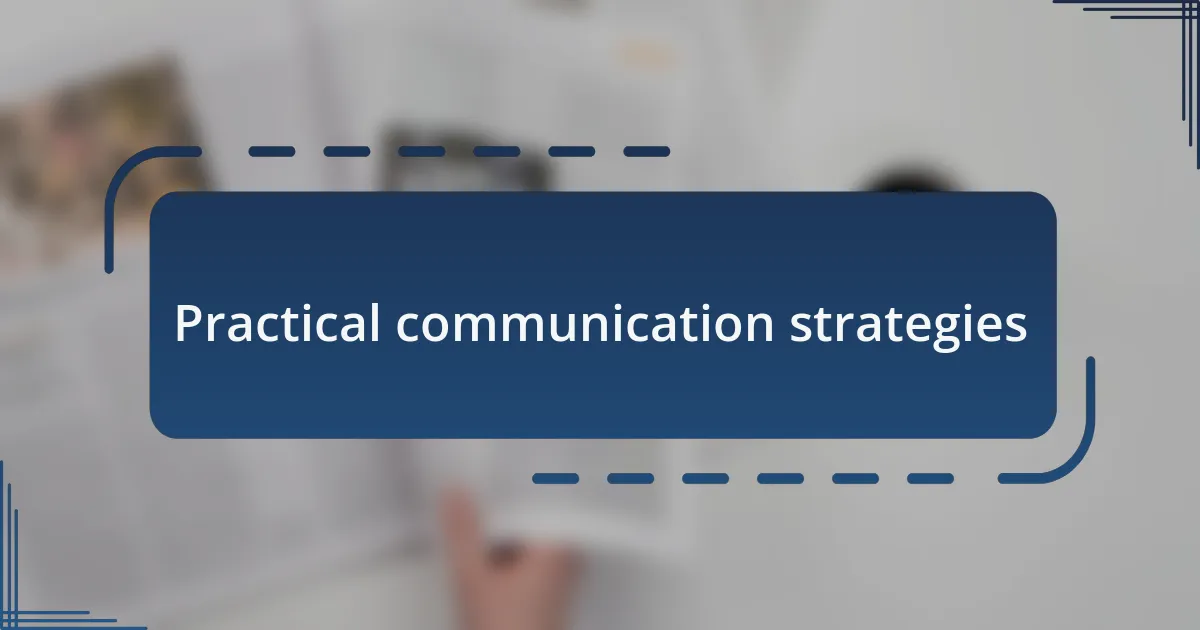
Practical communication strategies
One practical communication strategy I’ve often found effective is checking in with friends regularly, but in a way that feels casual rather than overwhelming. For instance, I like to send a simple text message, asking how they’re doing or if they need anything. This opens the door for them to share what’s on their mind without feeling pressured. Have you ever thought about how a small message can show someone you care even when life feels heavy?
Another approach that has worked for me involves asking open-ended questions that encourage deeper conversation. Instead of asking, “Did you see the news today?” I might say, “What’s your take on everything that’s been happening lately?” This shifts the focus from just reporting events to exploring feelings and opinions. In my experience, this kind of dialogue can lead to more meaningful exchanges. How often do you find yourself discussing the news in a way that feels personal and supportive?
Additionally, I believe that using humor can be a powerful tool. Once, I sent a friend a light-hearted meme about the absurdity of some current events. It wasn’t about dismissing the seriousness of the situation but rather providing a moment of laughter, which can be refreshing. Have you ever tried using humor to break the tension? It can remind us that it’s okay to find joy amid chaos.
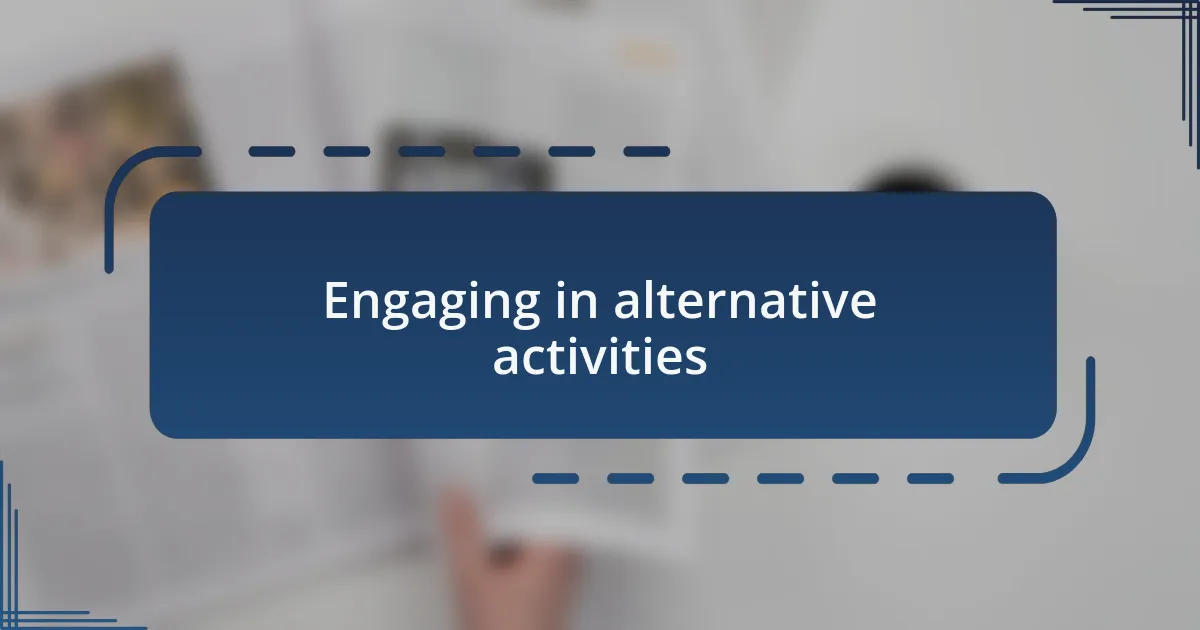
Engaging in alternative activities
Engaging in alternative activities can be a refreshing way to help friends cope with feelings of news fatigue. Personally, I’ve found that going for a long walk with a friend can shift our focus. The simple act of being outdoors, surrounded by nature, often sparks conversations that are less stressful and more lighthearted. Have you noticed how a change of scenery can lighten the mood?
I’ve also discovered the power of creative outlets. Last week, I suggested a painting night at home, complete with snacks and music. Not only did we create some fun art, but we also connected on a different level away from the constant barrage of news. How often do you take time to explore hobbies that ignite joy?
In my experience, even something as simple as a movie night can serve as a great distraction. I remember a particularly overwhelming week when I invited a few friends over, and we binge-watched a series. The laughter and shared stories during the breaks created a sense of camaraderie that reminded us to enjoy the moment. Have you ever reflected on how communal experiences can bring a sense of relief? They can offer a much-needed break from the heaviness of the world.
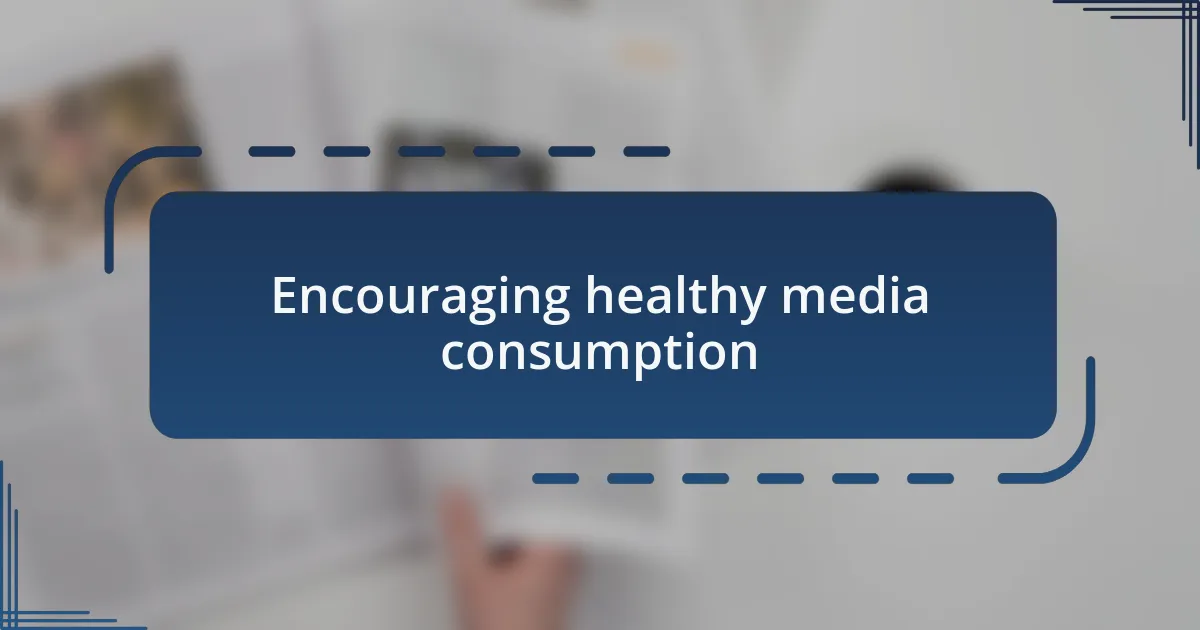
Encouraging healthy media consumption
Encouraging healthy media consumption begins with setting boundaries around news intake. I remember a time when I felt overwhelmed by constant notifications and endless scrolling. To regain control, I decided to limit my news consumption to just one focused hour a day. This simple change not only reduced my anxiety but also encouraged a more thoughtful engagement with the news. Have you ever tried creating similar boundaries for yourself?
Another strategy I advocate is curating your sources. There was a period when I followed multiple news channels, which only increased confusion and stress. When I narrowed my focus to a couple of reputable outlets, I found it easier to digest important news without feeling swamped. It’s crucial to ask yourself: Are the sources I follow adding value to my understanding, or are they contributing to my fatigue?
Lastly, fostering discussions about media consumption can bring clarity and connection. I once hosted a small group discussion where we shared our experiences with misleading headlines and sensationalists reports. This not only provided a space for venting frustrations but also helped us become more discerning viewers. Engaging actively with friends on this topic can lead to insights that enhance both your understanding and your emotional well-being. What insights have you gained from discussing media consumption with those around you?